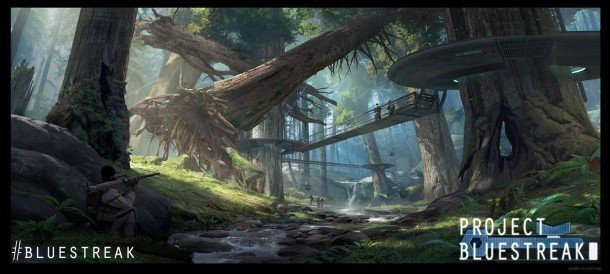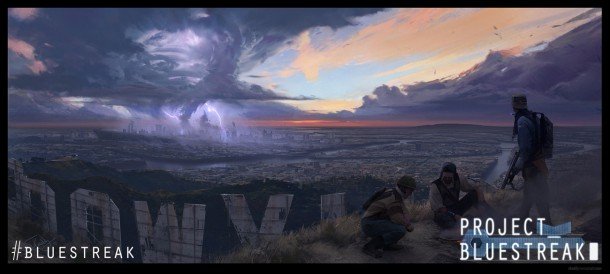Interview: Cliff Bleszinski on Project BlueStreak, PC gaming, FPS design, moddability

PCG: What do you like about a five-on-five format? What does that provide for players?
Bleszinski: It provides intimacy. It provides a chance to matter. When you're playing in a 10-on-10 or more and you're in the bottom third you feel really bad. But if you're four out of five, for some reason psychologically that doesn't feel as bad. Five is a good number for people to get online as opposed to corralling 10 people at once, especially if you have some adults with responsibilities on your team who have to put the kids to bed.
Five just seems like the magic number. It allows for maps to be medium-sized, and it doesn't encourage enormous, mech-based, vehicle-based, sniper-based maps. I want to be able to see the enemies that I'm fighting and kind of get a sense of what they're firing before they even shoot at me.
PCG: For me, a smaller scale is opportunity to develop a relationship with your enemy, too. Rivalries.
Bleszinski: Bigger is not necessarily better. When I talk about these combat distances… I wrote up a gun design doc the other day—it's so good to get back to doing this stuff—that outlined a lot of my philosophies about first-person weapon design. Generally speaking you should be able to tell what the gun does the second it comes up, before you even fire it. If it's super stubby, it's probably something more pistol-like or short range.
But the other main thing that we're doing, it's one of those cool little details, we're doing concept art of what the gun looks like pointed at you. I really want to get to a point where, just at a glance, you have that kind of “Oh, he's whipping out this weapon or that weapon, I need to figure out my maneuverability to get out of this situation because it's a fast-firing weapon,” or, “He's going to shoot that, but if I can dodge the first shot, he'll have to reload.“ All of that kind of metagame that happens in the background beyond people just slinging things at each other, you know?
PCG: What will you charge for in BlueStreak? Is the business model integrating with the design of the game at this stage?
Keep up to date with the most important stories and the best deals, as picked by the PC Gamer team.
Bleszinski: So, I like to use my restaurant metaphor: we've picked out the space, we know what genre of food we're going to be in, we're currently crafting the menu… how much it's going to cost for a side of butter, I don't know yet, right? And that's one of the things with working with Nexon, they're like, “Go build a fantastic game and a community around it, and we'll work on figuring out how to make it hopefully make a lot of money.”
As opposed to everyone else that I talked to about the free-to-play space, they're like, “Oh, you've gotta lead with your monetization strategy.” And I'm like, well, then I'm going to wind up with a game that's about crafting hats or something. I don't want that. When you look at the success of League and Dota, those are fantastic gameplay experiences first but they then kind of worked through figuring out what each one's monetization scheme was in that space. And one monetization scheme does not rule them all. I still see a lot of hatred in the pay-to-win category, and I said initially in the AMA I would like to avoid that as much as possible. There might be pay for slight perks, or pay for variety, but it's anyone's guess right now. And the thing is, with using the community to help develop this game, they can help dictate this a bit.

PCG: Is moddability something you've examined yet?
Bleszinski: Well, it will be. What I love about the modding community is that they keep the developers honest. You look at what happened with Watch Dogs, and the conspiracy theorists continuing to wonder why that stuff was cut out. A lot of the best games, a lot of the best talent comes out of the mod community because the mod community doesn't have all of the bullshit red tape that keeps innovation back sometimes in this industry. You look at… there's a new mod that came out for Portal 2 that's just the paint gun, I love that kind of stuff. Will we embrace that? Hopefully. But again, let's figure out the darn game first.
PCG: Do you feel like publishers in general are more interested in or more hesitant about free-to-play right now?
Bleszinski: My gut is saying that a lot of them… what's a good way of putting it. They find it interesting, but I don't know if they know how to transition or do it properly. And it's like this weird, struggling to maintain the old model of E3 and, oh, you know, shocking press roll-outs and conferences… and that just feels so 2008 to me in regards to “let's get GameStop excited about our pre-orders and Walmart gets the blue hat,” and I'm like, “Really, this still happens now?”
When you look at traditional publishers, and they look at their bottom lines, they have their established, killer franchises which are still doing rather well, but it's like… you've got to be planting the seeds for where things are going to be in three or five years, especially technology. Take some of that Call of Duty and Assassin's Creed and Halo money and have incubator teams that are working on small, free-to-play projects, small new original IPs that could be the next god-knows-what as opposed to just wearing that rubber stamp out and wondering “Where's the next rubber stamp coming from? Oh, wait, I'm sorry, we pissed off those developers and they all left, darn it, we don't have anyone else,” and that's the cycle that continues.
PCG: Will BlueStreak use a skill-based matchmaking system?
Bleszinski: Have not worked it out yet. That's further down the line. And that's a full-time job—I hear rumors that there are a lot of people working on that for Destiny. During Gears 2, our matchmaking was broken when the game launched. It might just be a situation where we let the internet sort it out by itself and people can wind up with really bad or really good players. I mean, we didn't really have any of that in the Unreal Tournament days, it just sort of sorted itself out. So we'll cross that bridge when we come to it and we'll have many, many passionate meetings where we throw many, many Nerf guns at one another.
PCG: What else can you tell us about the game at this point? What feelings do you want players to have?
Bleszinski: I can't really give you much more on that without tipping my hand. One thing I have alluded to is what I've learned from the NFL, and the sense of tribalism and local pride, that is incredibly powerful. That's something I really want to lean on.
PCG: Right, it's tough for multiplayer shooters to have lore, to build a story or context that people are invested in. Titanfall's an interesting attempt at that.
Bleszinski: You have to be careful. If you look at a game like Hawken, they put a little bit of the IP first before they really nailed a lot of what the core of the game was supposed to be about. When you do a multiplayer, sci-fi game, you need to tell as much of the narrative in an ancillary fashion as possible. We have enough of a budget that we'll get some live-action, animated shorts pumped out once a quarter from some really talented LA studios, kind of like the live-action Portal video. The more you're multiplayer, the more you need all that lore and supplemental stuff to flesh out the universe.
That's one thing that Blizzard does… when you click on the characters in their games or you play Hearthstone. Yeah, the voice acting's over the top, but it's so chewy and fun. Blizzard realized this many years ago: if you're clicking on these tiny, five-pixel characters, they have to say really grandiose things and have portraits, and they need to be rendered in spectacular detail in these CG movies, and then they become beloved characters worldwide.
PCG: Thanks for your time. Anything else you want to share?
Bleszinski: It's good to be back on PC.

Evan's a hardcore FPS enthusiast who joined PC Gamer in 2008. After an era spent publishing reviews, news, and cover features, he now oversees editorial operations for PC Gamer worldwide, including setting policy, training, and editing stories written by the wider team. His most-played FPSes are CS:GO, Team Fortress 2, Team Fortress Classic, Rainbow Six Siege, and Arma 2. His first multiplayer FPS was Quake 2, played on serial LAN in his uncle's basement, the ideal conditions for instilling a lifelong fondness for fragging. Evan also leads production of the PC Gaming Show, the annual E3 showcase event dedicated to PC gaming.

